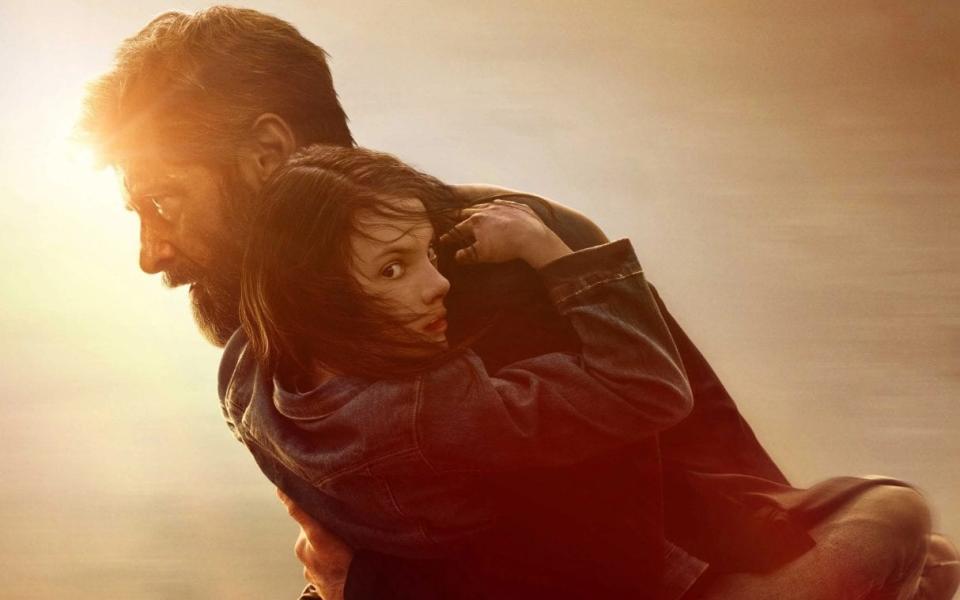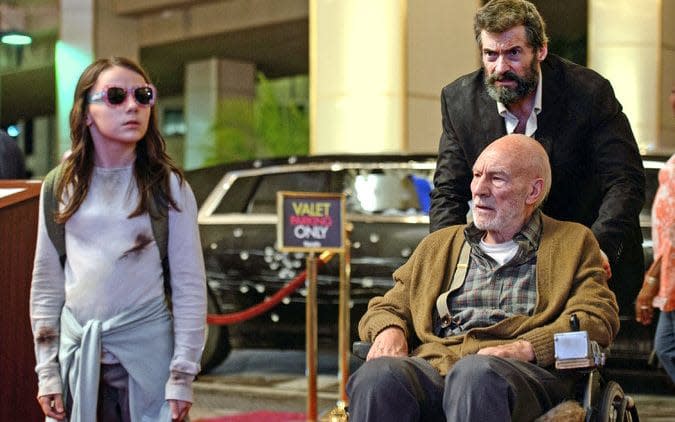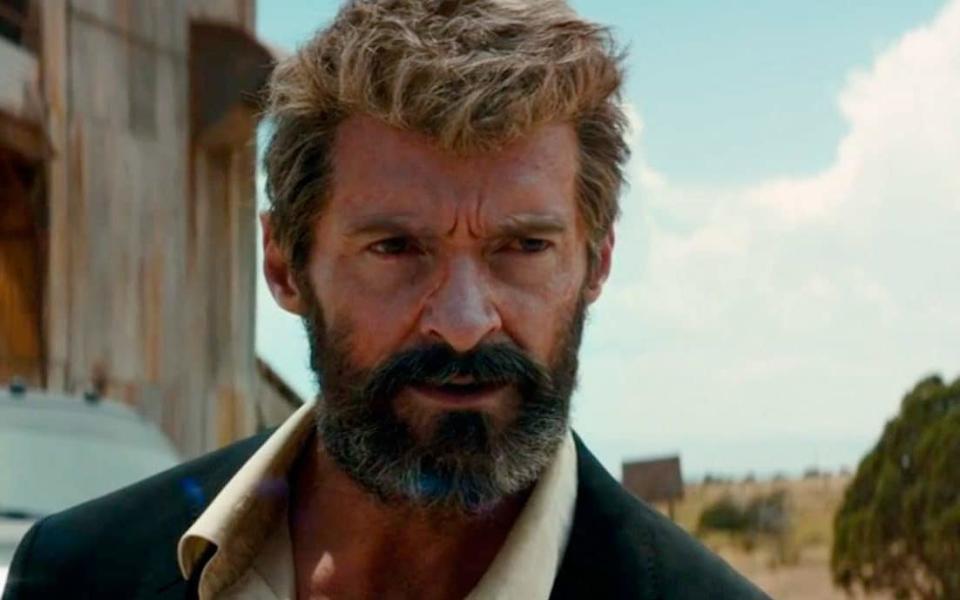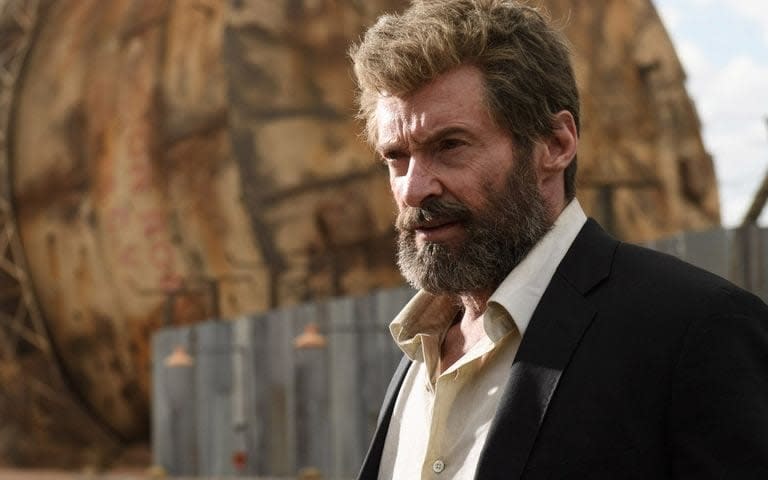Logan review: Hugh Jackman's last turn as Wolverine is the real, shotgun-toting, limb-lopping deal
Director: James Mangold. Starring: Hugh Jackman, Dafne Keen, Patrick Stewart, Boyd Holbrook, Stephen Merchant, Richard E. Grant. Cert: 15. Time: 135 mins.
Why do so many superhero films sold as ‘for mature audiences’ feel like they’re meant for exactly the opposite? Whatever the reason, this emphatically isn’t the case with Logan, the third – and by a significant margin, best – lone outing for Hugh Jackman’s well-knit and whiskery mutant.
You might assume James Mangold’s film, which had its world premiere at the Berlin Film Festival this evening, is meant as a sequel to the two other solo Wolverine pictures, 2009’s X-Men Origins: Wolverine and 2013’s The Wolverine. But watching it, you’re struck by the thought that it could be set in a world in which those earlier films were just films – and this paranoid, punishingly violent noir western is the real, shotgun-toting, limb-lopping deal.
Occasionally in Logan, Jackman’s character reaches for dog-eared X-Men comic books and tuts at their primary coloured, thrill-a-minute content. The implication – admirably, it’s never spelled out – is that his previous escapades inspired a spin-off publishing arm, built on stories of the kind of heroism beyond the capacity of their subject.
This Logan is less like a superhero than Alan Ladd’s Shane, a noble loner drawn into the orbit of someone else’s fight, which in turn becomes inescapably personal. In fact, the spectre of Shane looms so large in Logan that at one point some of the characters actually sit down to watch it. Professor Charles Xavier, played again by Patrick Stewart, describes it as “almost 100 years old”, which places the action at some point between now and 2053.
Logan’s plot pushes its titular hero out into the (largely rural) America of this near future, with a young girl called Laura (Dafne Keen), the first new mutant to surface in 25 years, under his protection. That premise suggests the sinuous science-fiction of Children of Men, though the film owes far more to early John Carpenter – both in its snaps of shock-and-awe brutality and Mangold’s nerve-stiffening composition and framing.
Also, extraordinarily, there’s a waft of Samuel Beckett: lately on stage, Stewart was the Didi to his X-Men co-star Ian McKellen’s Gogo in Waiting for Godot, and here the vibe’s pure Endgame. When we’re reintroduced to the wheelchair-bound Professor Xavier, he’s a ranting invalid living in a toppled water tower, where he’s waited on by Stephen Merchant’s pallid, stooping Caliban. It’s a tidy little Hamm and Clov domestic set-up, smartly in tune with the film’s rust-eaten, end-of-days aesthetic.
Crucially, Logan puts Jackman to better use than any other entry in the X-Men franchise, during which he’s often seemed tamped down by the constrictions of an ensemble cast or feeble script (and sometimes both). Though his character is visibly older, facial hair grown out and flecked with grey, Jackman’s charisma and bulk are both strappingly undiminished.
An early set-to with carjackers establishes him as a force to be reckoned with, and also lays out the film’s commitment to its violence, which is detailed, visceral and creatively nasty – the fight scenes are explosions of rage more than displays of martial prowess. (The film hasn’t yet been rated by the BBFC, but it’s a dead-cert 15.)
It’s while working as a limousine driver in the borderlands of Texas that Logan encounters Laura, and also the shadowy agency trying to capture her, a private military company called the Reavers led by Boyd Holbrook’s smirking sadist-in-chief. (Richard E. Grant also crops up as a Mengele-like eugenicist.)
The fact Laura is of Hispanic origin and is being hunted down by a military group gives the film a topical tang, which is also detectable in the plot’s use of national borders, which become thresholds to redemption. The United States feels less like the Land of the Free here than a vast open prison, and Logan and Laura’s race northwards to safety has the knife-edge tenor of a jailbreak.
There is something of Mad Max in a terrifically staged desert car chase – in fact, at times the bearded, wild-eyed Jackman looks uncannily like a mid-penance Mel Gibson – and there as elsewhere, the use of computer graphics is subtle, and the action looks dusty and authentic.
Marco Beltrami’s nervy, evocative score, peppered with rumbling synths and jabs of piano, is a perfect match, as are the incidental songs by Johnny Cash, Jim Croce and other gravelly brooders. But the film is as tense and gripping in its quieter moments – of which there are plenty – as its set-piece showdowns.
Eleven-year-old Keen, who’s making her film debut, does impressive work in a tricky, near-wordless (though far from silent) role – while Jackman seizes on the chance to go deeper and bigger with this character than ever before.
How much fans of the series will take to all this isn’t immediately obvious: Logan is a film for people, like me, who thought the only good bit of X-Men: Apocalypse was Michael Fassbender crying in the woods, and left the cinema wishing that had been the whole thing. It’s something no-one could have expected: a creatively risky superhero movie. And it deserves to pay off.
Logan is released in UK cinemas on Wednesday 1st March.
Best superhero movies of all time





